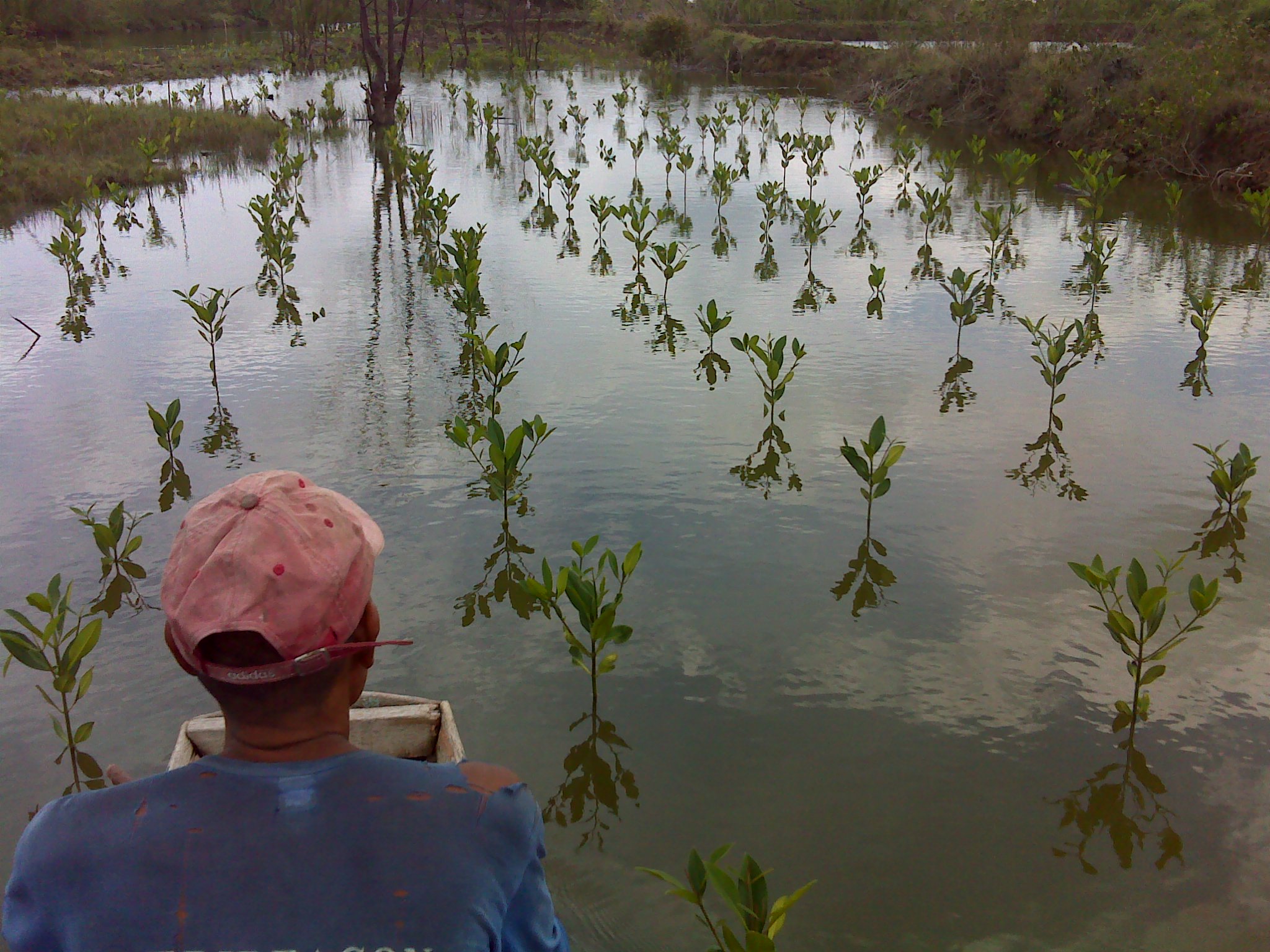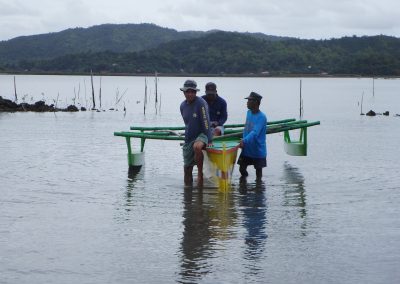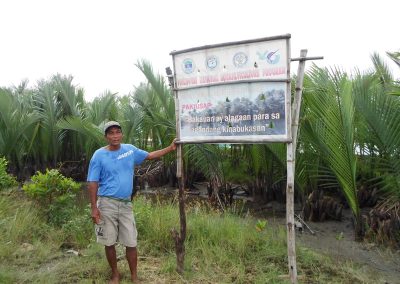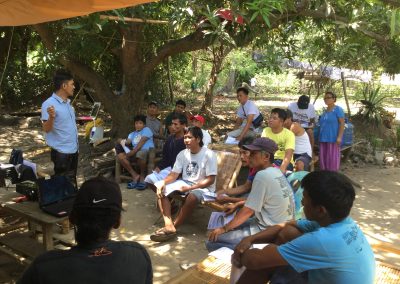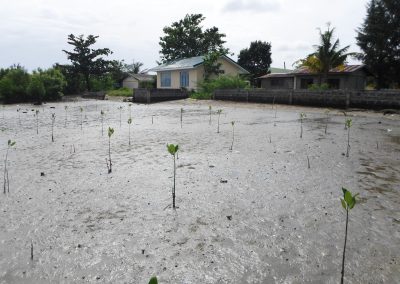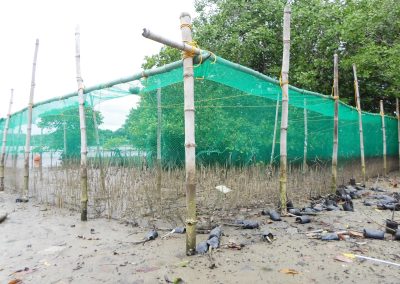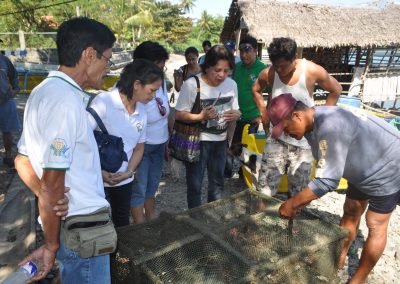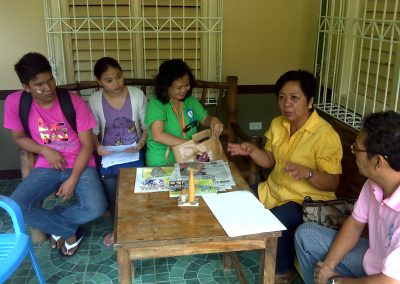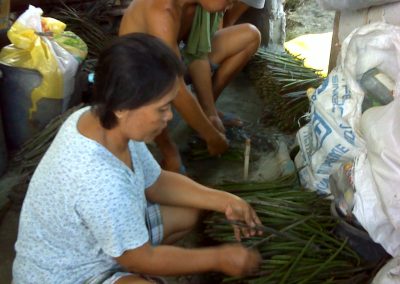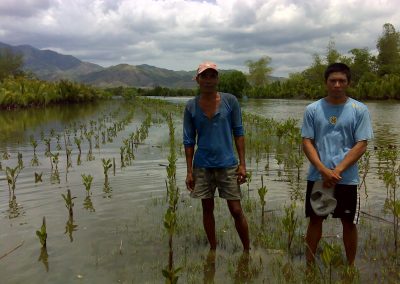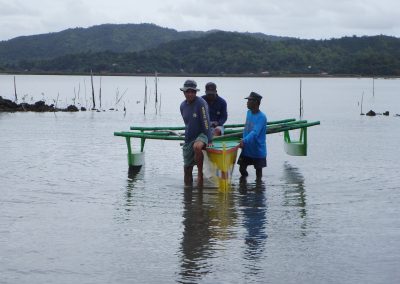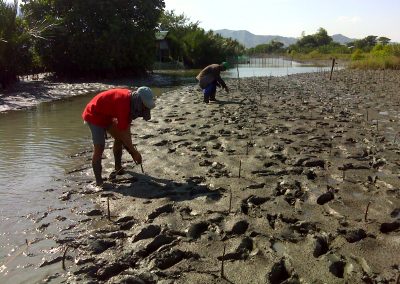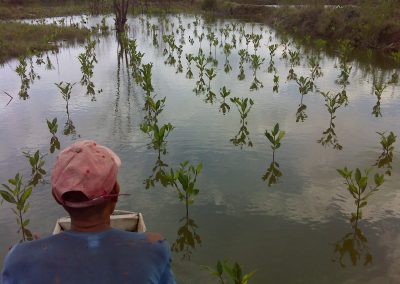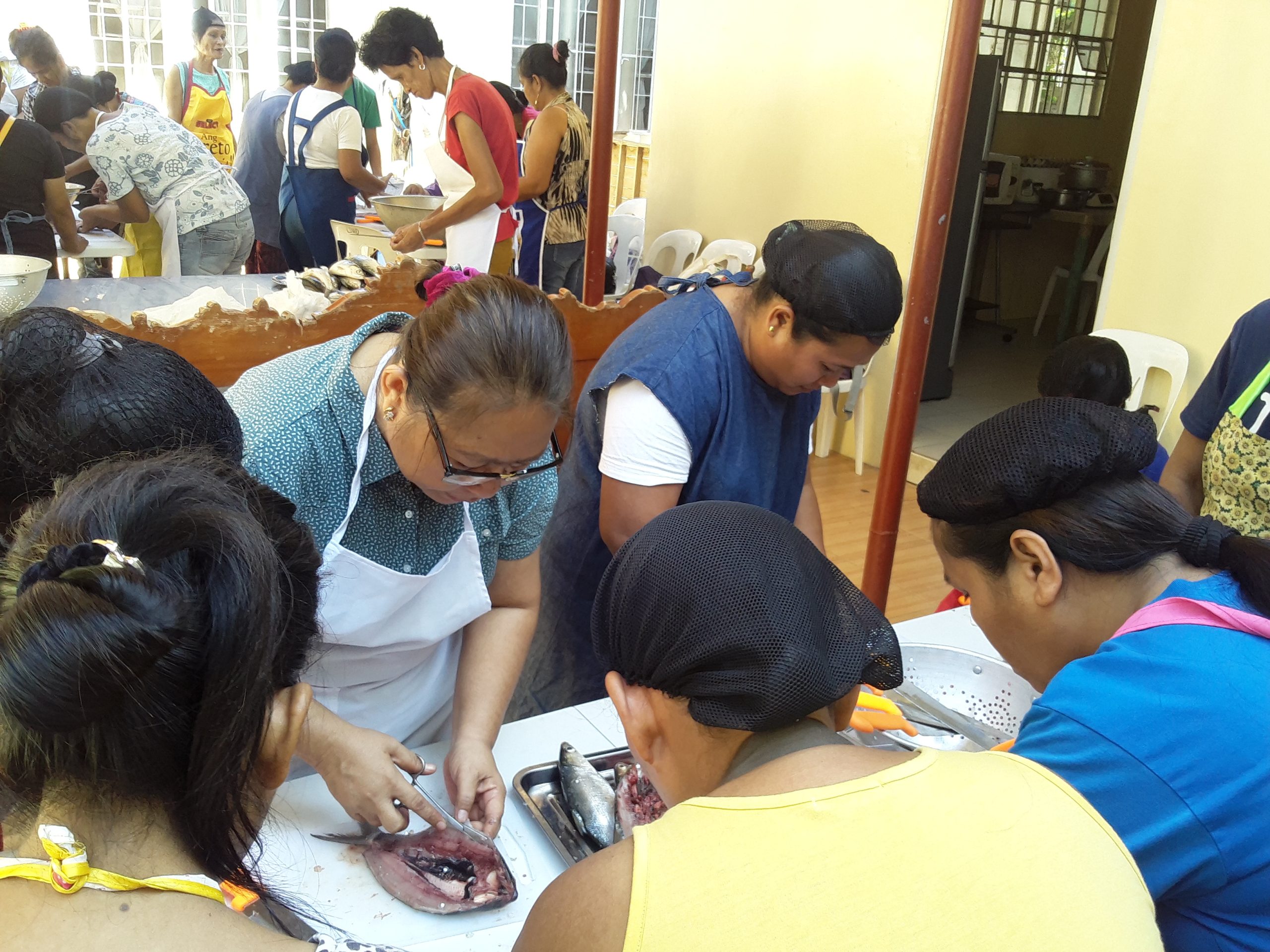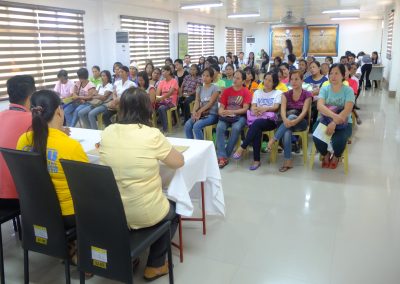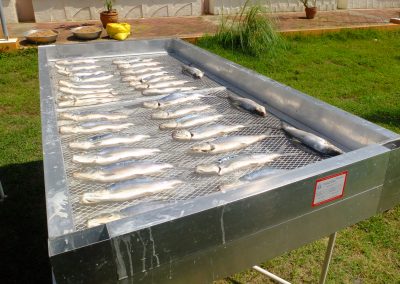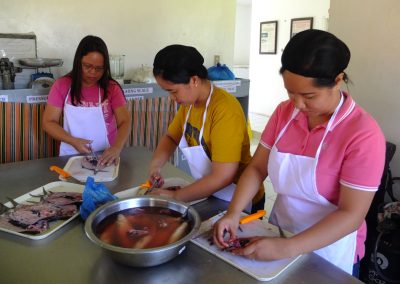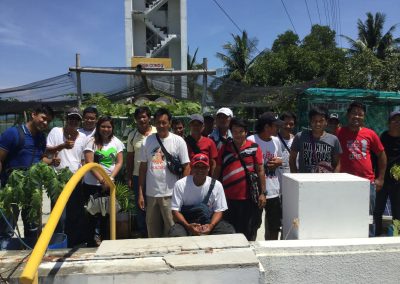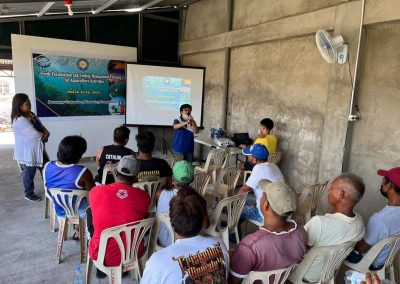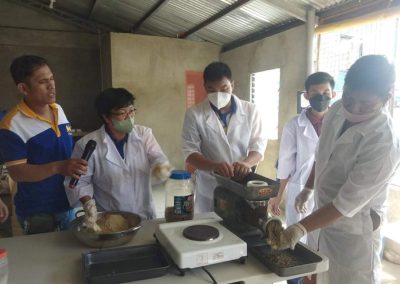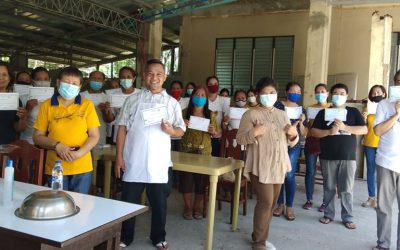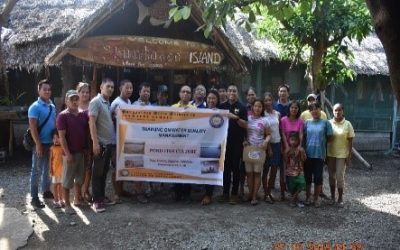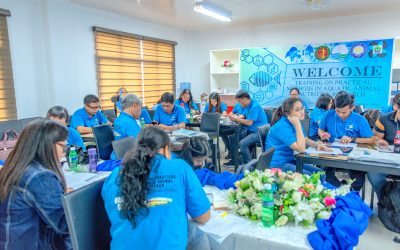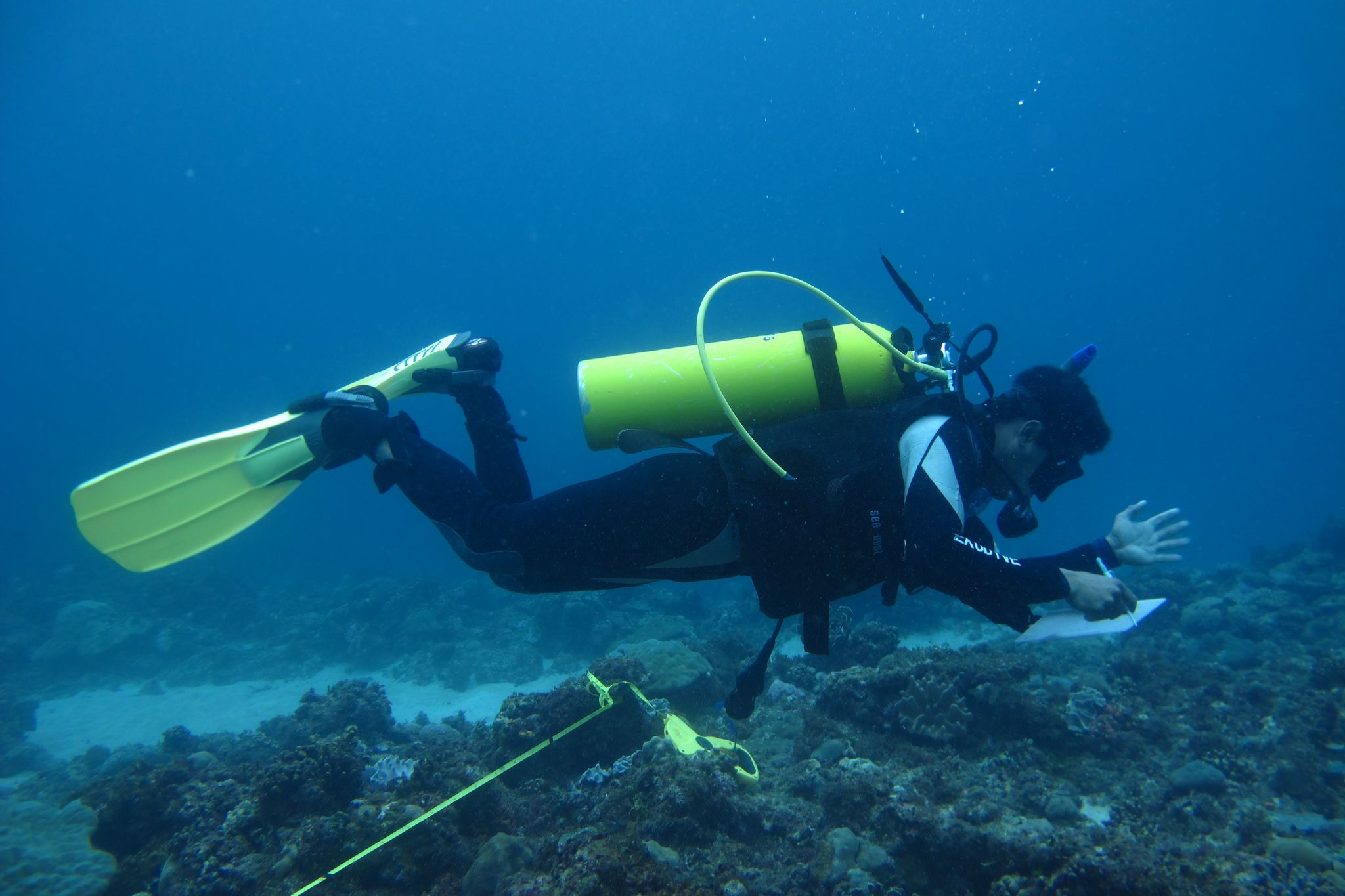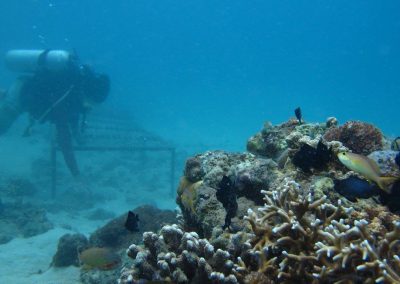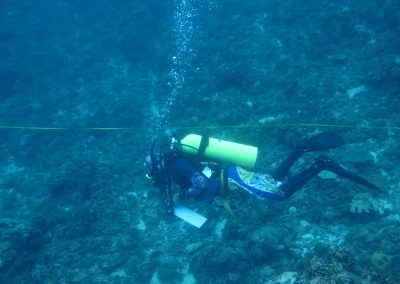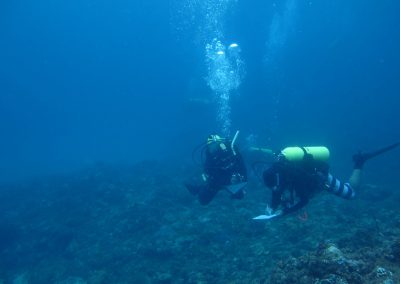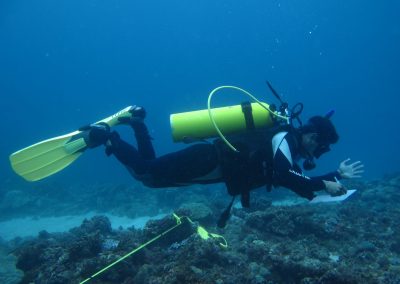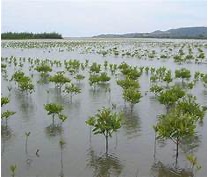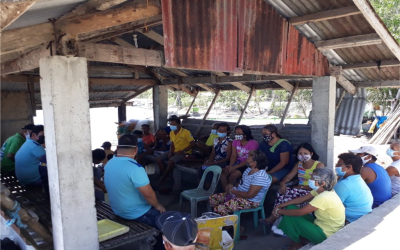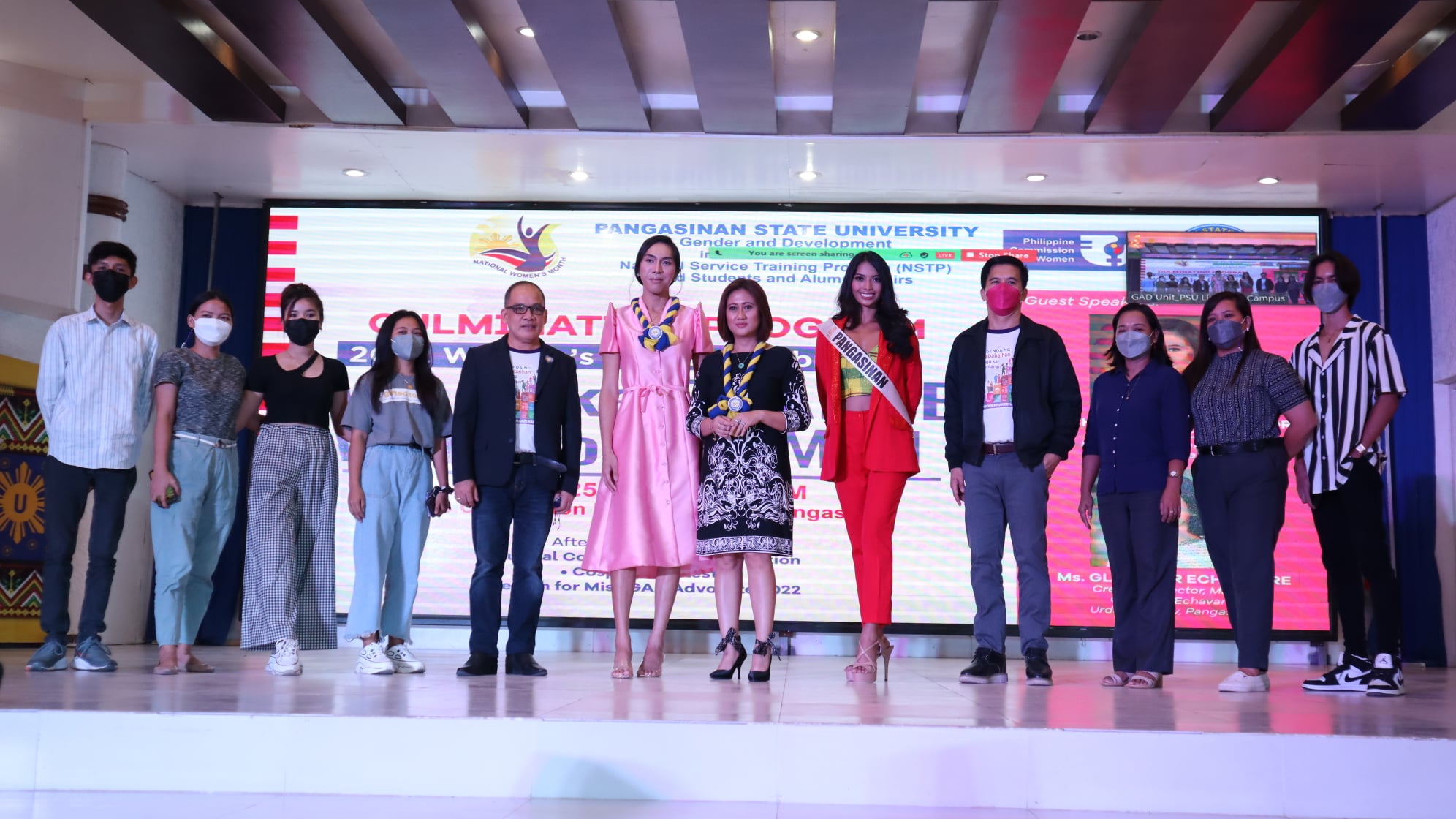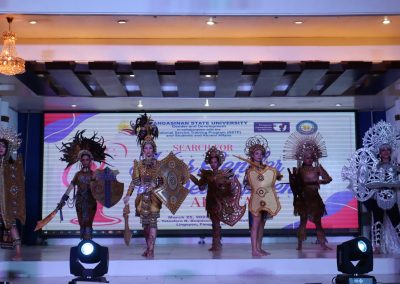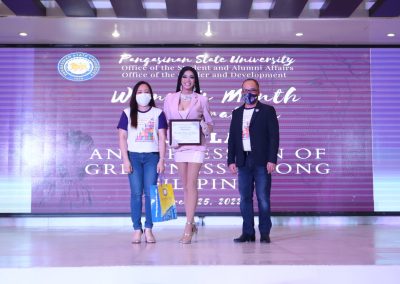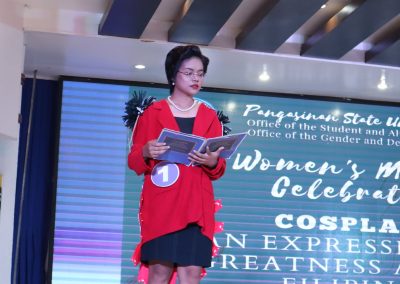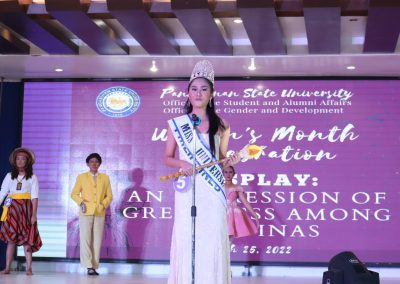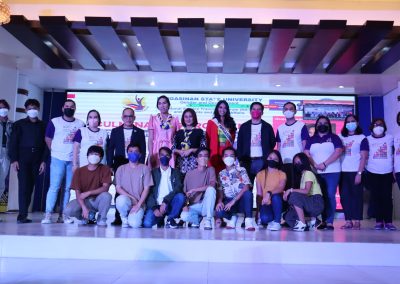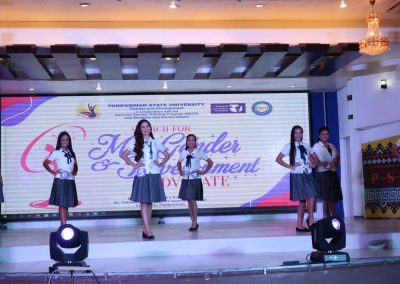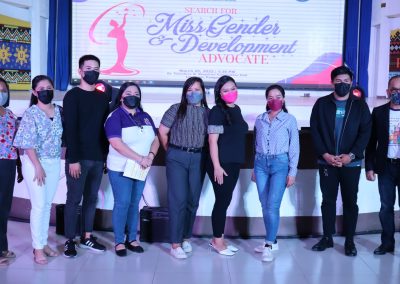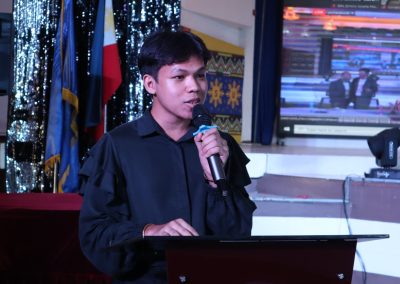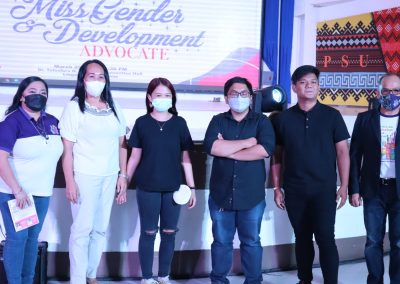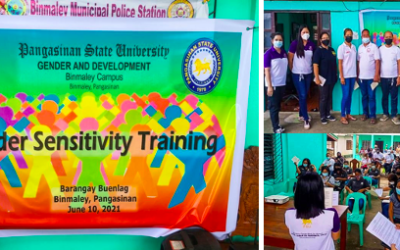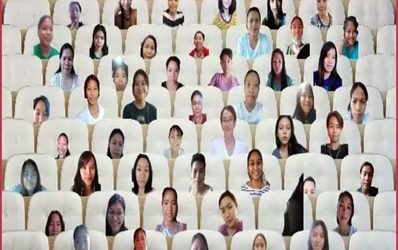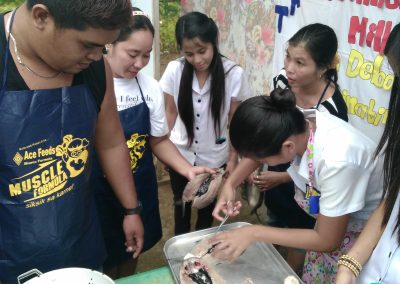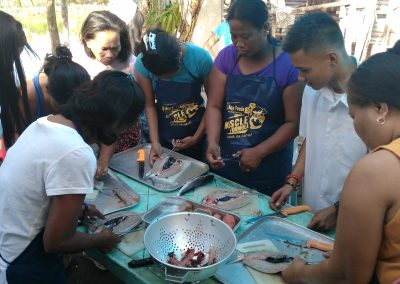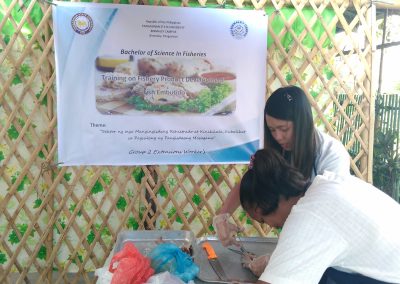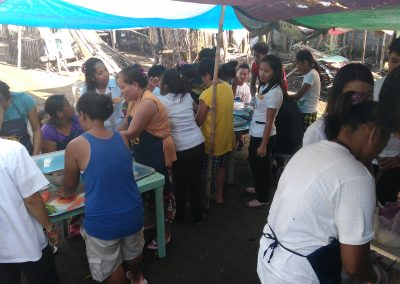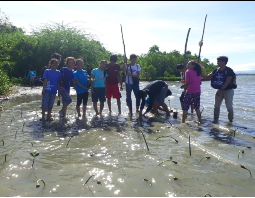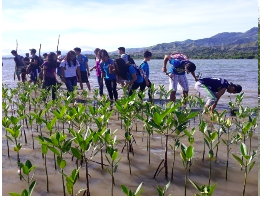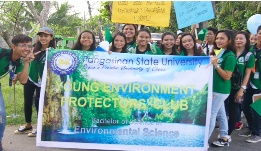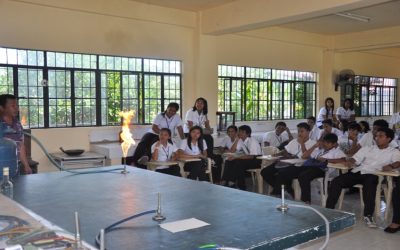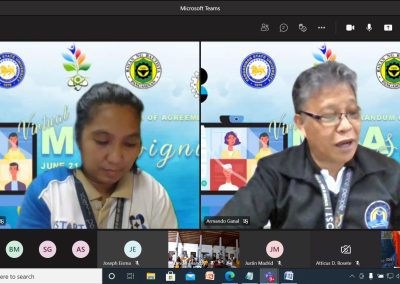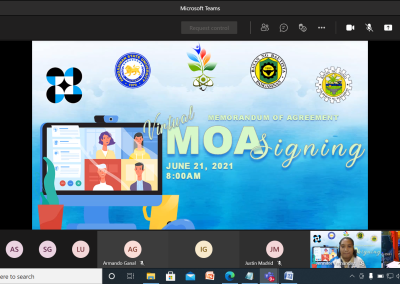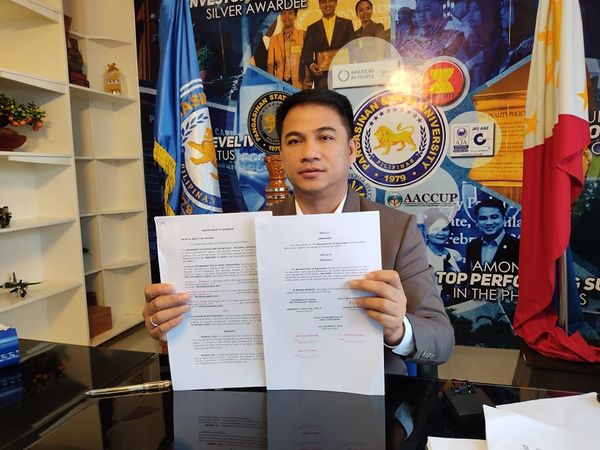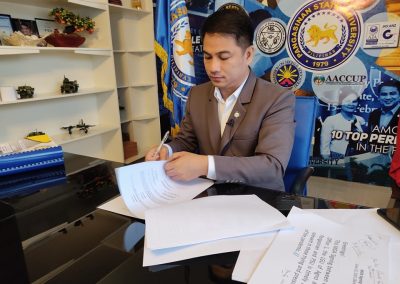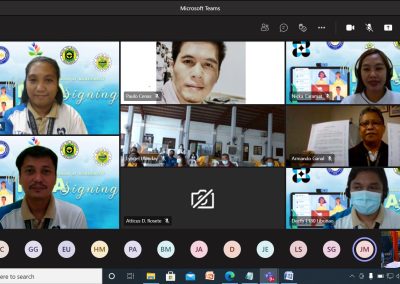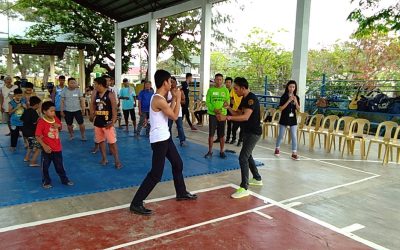TrainingS
Philippine National Aquasilviculture Program
The Philippine National Aquasilviculture Program (PNAP) is a collaborative project under the Department of Agriculture-Bureau of Fisheries and Aquatic Resources (DA-BFAR) and Commission on Higher Education (CHED) through State Universities and Colleges (SUC’s) participated by 62 SUC’s through out the country.
This program is comprised of three different projects namely, (a) Mangrove Resource Rehabilitation, (b) Aquasilviculture and (c) Community-based Multi Species Hatchery. The main objective of this program is to provide additional livelihood and as source of income to the coastal community/fisherfolk through mangrove-friendly aquaculture (Aquasilviculture), natural stock enhancement and protection and rehabilitation of mangrove resources.
In Pangasinan, the Philippine National Aquasilviculture Program, particularly mangrove rehabilitation was strategically established/located in 27 coastal barangays from 7 coastal municipalities, which includes the municipality of Binmaley, Lingayen, Labrador, Sual, Anda (1st phase), San Fabian and Dagupan City (2nd phase). The reforestation project covers the 50% of coastal areas in the province.
In total, 450,000 propagules were planted in the province in which 180,000 propagules were planted during the first phase while 270,000 propagules for second phase. The second phase was approved due to the success or high survival of the planted propagules. The beneficiaries (95 individuals/families) was compensated for every mangrove propagule planted and survive. In which, beneficiaries have received an equivalent of 2.7 million pesos for this project.
However, for the community-based multi-species hatchery the use of lying-in technique was applied where Abalone and blue swimming crab was chosen due to its abundance in the specific area. Abalone was locally harvested in the municipality of Anda while, blue swimming crab was also abundant in the municipality of Sual. Both species are considered high-value species with high market demand. This extension project directly benefited 20 families, but due to enhancement concept through time those species will provide more to the coastal communities particularly to the fisherman. In addition, through this extension project a research paper was published.
Moreover, for the aquasilviculture, a total of 16 families benefited in this project. Each family was provided with materials for pen construction, labors and farm inputs. Mangrove crab and grouper were used as farm animals which was cultured within 6 months. The initial investment and income to that project was used as a revolving fund to sustain the project.
Dr. Rosie S. Abalos and Dr. Shella C. Parreno serves as program leader and Assistant program leader respectively. While Dr. Emmanuel Federico Capinpin, Jr. was in-charge in the Lying-in project, Dr. Geronimo Rosario for Aquasilviculture and Mr. Raul V. Dela Pena for Mangrove Reforestation. This program was also presented in the world Aquaculture Forum in Las Vegas, Nevada.
Micro-enterprise Development on Sustainable Livelihood Program in Fish Product Development in the Province of Pangasinan
The Extension services office of Pangasinan State University-Binmaley Campus in collaboration with the Department of Social Welfare and Development Field office Region 1 had conducted a skills training on Micro-enterprise Development on Sustainable Livelihood Program in Fish Product Development in the Province of Pangasinan.
The said training aims to provide an additional source of livelihood to 4P’s members ( Beneficiaries on conditional cash transfer program) in uplifting their socio-economic condition. In total, 63 participants benefited from the municipality of Lingayen and Dagupan City, Pangasinan.
During the training, hands-on demonstration on various fish process products specifically for Milkfish was done, which includes deboned milkfish, smoked milkfish, milkfish tocino, fermented milkfish, milkfish patty, pressurized milkfish, bottled milkfish, milkfish longganisa (chorizo), milkfish polvoron (powdered), milkfish lumpia, and milkfish embutido.
Faculty and extensionist from Pangasinan State University-Binmaley Campus including Dr. Dominica J. Sajonas (Project leader), Dr. Rosario B. Miguel, Prof. Margelita D. Gorimbao (+), Mr. Lemark M. Bautista, Mr. Ricardo A. De Guzman, and Mr. Raul V. Dela Peña were served as trainers and resource speakers during the event. The training was conducted last April 23 to May 5, 2018 at the Regional Training & Livelihood Center in PSU-Binmaley Campus, Binmaley, Pangasinan.
The Pangasinan State University-Binmaley Campus, through the initiative of Dr. Rosie S. Abalos, Dean of the College of Fisheries and Environmental Sciences, and with the assistance of Dr. Dominica J. Sajonas, Campus Extension Coordinator, conducted a two-day extension training entitled “Feeds Formulation and Feeding Management Training For Aquaculture Activities” in Barangay Canaoalan, Binmaley, Pangasinan last March 24-25, 2022.
Different topics were discussed during the first day. Dr. Rosie S. Abalos talked about the training overview as well as feeds and feeding management, including feed formulation. Ms. Jennie B. Fernandez tackled the essential nutrient requirements for fish while Dr. Emmanuel Federico C. Capinpin, Jr. discoursed on the locally available plants and animals as sources of feed ingredients.
A hands-on demonstration on feed formulation was conducted on the second day of the training activity. Participants were accompanied by the CFES faculty and staff in making an aquaculture feed out of combined ingredients of fish meal, rice bran, soya oil, corn starch and vitmin pro. They were also taught the right percentages of each ingredient to be used and the proper procedure to be done in making an aquaculture feeds.
The said extension training ended with a closing remarks delivered by Dr. Rosie S. Abalos. Certificates of participation were also given to each participant. Training evaluation and customer satisfactory form were also distributed to the trainees by Dr. Dominica J. Sajonas.
A total of 45 participants came from the local fisherfolk of the said barangay, including the CFES faculty and staff, attended the said training
The Our Lady of Purification Parish in Binmaley
The Our Lady of Purification Parish in Binmaley, thru our dynamic priests Msgr. Oliver Mendoza,...
Training on Water Quality Management for Pond Fish Culture
The training on water quality management for pond fish culture was conducted on December 27-28,...
Practical Methods in Aquatic Animal Nutrition Research
To fulfill the mission of the Pangasinan State University-Binmaley Campus which is provide...
Outreach
Pangasinan State University Binmaley Campus opened its own community pantry at the campus covered court. This community pantry was inspired by the Maginhawa community pantry in Quezon City, founded and headed by Ana Patricia Non, with a tagline “Magbigay ayon sa kakayahan, kumuha batay sa pangangailangan”.
This community food bank was established to aid people amid the Covid-19 pandemic which also striked the employment rate and economic status of the country. Such circumstances lead to this kind of activity that showed the natural “bayanihan” spirit of the Filipino people which the pantry captured, thus, making it easier for the people to lend a hand to those who are in need.
The community pantry of PSU Binmaley Campus was started last May 18, 2021 and over 200 individuals benefitted from this activity, specially the residents of Barangay San Isidro Norte, Binmaley, Pangasinan.
This community pantry was spearheaded by the Campus Executive Director Dr. Roy C. Ferrer, together with the PSU Binmaley employees who took the initiative to pack the goods for this pantry.
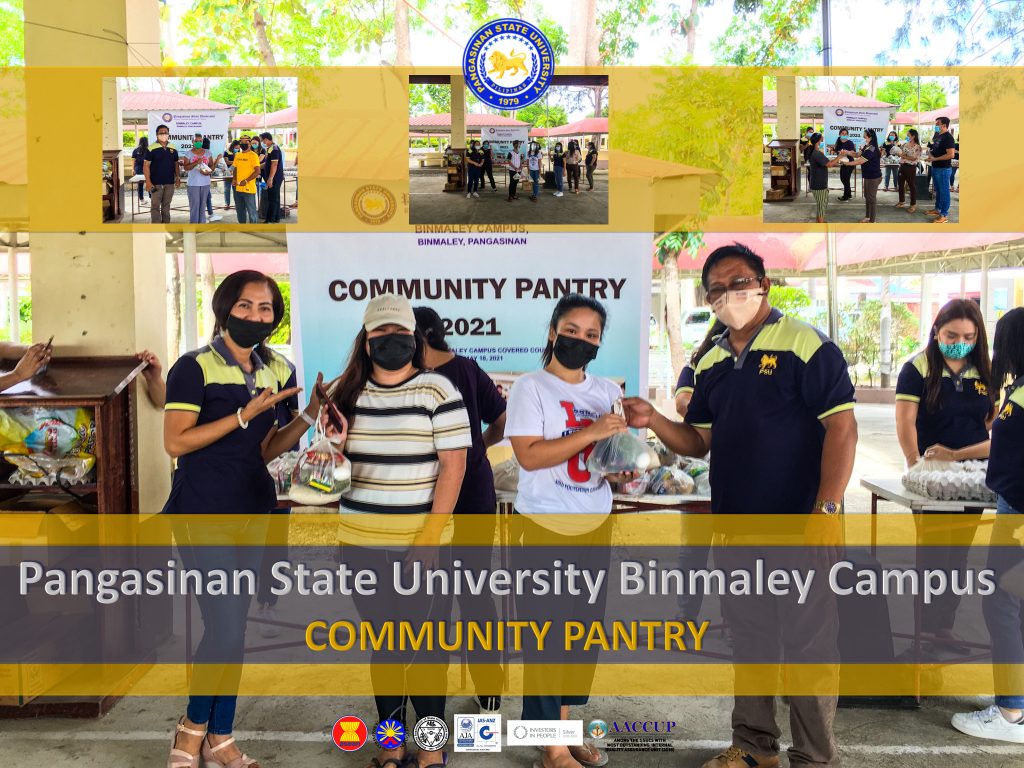
Provide habitats to millions of marine species – the coral reefs are said to be one of the most diverse and prolific ecological units in the globe. Therefore, coral reefs significantly contribute to fisheries productivity. The state of Philippine coral reefs, however, is at risk as it suffers serious degradation and massive decline caused by human devious activities such as destructive fishing practices, overfishing and coastal developments. Moreover, global warming effects with the threats posed by natural calamities also contributed to ocean acidification and coral bleaching. As a response for the enhancement of damaged reefs, mass regrowing of coral reefs was commenced in 2012 with the initiative of DOST-PCAARRD through the program entitled “Roll-out of Coral Transplantation Technology Using Asexually Reproduced Coral to Improve Productivity of Coral Resources for Sustainable Fisheries and Enhance Competitiveness of Underwater Tourism” with the implementation of various Higher Education Institutions (HEIs) across the country in cooperation of local government units. HEIs involved in the implementation are the University of San Carlos, Bicol University, Mindanao State University, Batangas State University, Bohol Island State University, Aklan State University, and Southern Leyte State University. In 2014, DOST-PCAARRD with PSU and the LGU of Alaminos City rolled out the “Application of Coral Transplantation Technology to Improve Productivity of Coral Reef Resources for Responsible and Sustainable Fisheries and Harness Potentials of Alaminos City, Pangasinan for Underwater Tourism Project” in Mayor’s Island, Hundred Islands National Park (HINP). There are 30, 000 numbers of fragment for transplantation targeted for completion until the first quarter of 2017 through the use of coral nursery units (CNUs) and nail and cable method technologies. The project also aims to identify and document potential stream of dive sites; develop a pool of human resources for coral restoration and eco-tourism that could jump-start coral restoration service industry; and promote science-based coral reef management.
Integrated Aquatic Ecosystem Management: Pangasinan State University’s Multidisciplinary Approach to Sustainable Marine and Freshwater Resources
Pangasinan State University (PSU), as an educational institution, indeed has a comprehensive...
Protecting the Oceans: How Pangasinan State University is Promoting Sustainable Fishing and Marine Conservation
Along the shores of Lingayen Gulf in the Philippines lies Pangasinan State University (PSU), an...
Gender And Development(GAD)
Celebrating womanhood and greater gender equality, the Pangasinan State University Gender and Development (GAD) unit spearheaded a culminating activity for National Women’s Month on March 25 at the Dr. Telesforo N. Boquiren Convention Hall.
In collaboration with the National Service Training Program (NSTP) headed by Dr. Romary R. Lincod and the Students and Alumni Affairs Office headed by Prof. Celeste T. Mercado, the festive celebration and lined activities circled on Philippine Commission for Women’s (PCW) 6-year (2016-2022) theme, ‘We Make Change Work for Women.’
VP for Research, Extension, and Innovation, Dr. Paulo V. Cenas, GAD Director, Dr. Gilbert P. Moralista, and NSTP Director, Dr. Romary R. Lincod led the event, which was participated by PSU-SC’s GAD Coordinator, Dr. Janelle D. Rosal, University officials, and the PSUnian community.
“PSU has always upheld women’s rights and acknowledged them as agents of change. The program also highlights the gains and achievements of women as the country works towards the achievement of gender equality and women empowerment,” Dr. Moralista underscored.
Among the guests invited were prominent figures in the province and staunch advocates of women’s empowerment, including former GMA 7 anchor and recently appointed JCI-Dagupan President, Hon. Charisse Mae C. Victorio with Urdaneta City’s pride creative director, Ms. Glademir Echavarre.
2022 NWMC culminated through a rich showcase of talents and prowess through a cosplay competition featuring remarkable women in Philippine history, a musical composition and rendition contest, and the highlight of the event, Search for Miss GAD Advocate.
“Let us work for a stronger world and a better future for all with equal rights for men and women and inter-sex,” a solid quotation uttered by Dr. Romary Lincod as she gave her closing remarks.
PSU through its GAD and NSTP remains a stalwart institution in advancing women empowerment reflected in its successive university-wide activities, creating platforms for active virtual and facilitated discussions of relevant issues concerning gaps and issues among women in society.
PSU stands firm in its advocacy in continuously empowering women as prime movers of sustainable and responsive development, and as builders of a society where gender equality permeates as a shared value and not a means of tolerance.
Gender Sensitivity Extension Activity
One of the endorsed Gender and Development activities by the Philippine Commission on Women (PCW)...
Gender Sensitivity Training on Issues, Concerns and Legal Mandates for 1st Year Students of PSU-Binmaley Campus (Webinar)
The Department of Education issued a gender-responsive basic education that expressly...
STUDENTS
Training on Deboned Bangus and Fish Embutido
Fishery Product Development provided the participant’s technology transfer on knowledge and skills on milkfish deboning and making fish embutido. The conducted activity was livelihood training for housewives and out-of-school youth/adults in the coastal community in Binmaley. The training was led by the students under the Bachelor of Science in Fisheries as part of their subjects in Fish Processing technology. The said activity was held last November 26, 2019, at Brgy. San Isidro Norte, Binmaley, Pangasinan, and was attended by twenty-five (25) participants.
Fish Conservation week: Mangrove Reforestation Project
As part of fish conservation week, the students take part in the activities by planting mangroves on the riverbank of Barangay Salapingao in Lingayen, Pangasinan. Graduating students with the BS in Fisheries and Aquatic Science and BS in Environmental Science initiated the activities which aim to protect the resources and promote the fishery resources within the area.
Mr. Lemark M. Bautista and Mr. Raul V. Dela Pena faculty and extensionist assist the students in the conduct of the said activity. This 1-day activity was conducted last September 26, 2019.
BS Fisheries and Aquatic Sciences and BS Environmental Science students together with the community students conduct extension activities on the planting of mangroves in the riverbanks of Brgy. Salipangao, Lingayen.
PSU Strengthens REIGn Centers and R&D Facilities for Fisheries Program
As research, extension and innovation play a crucial role in advancing research and...
OTHERS
The project entitled “Engaging Local Communities with Science, Technology, and Innovation for Development” aims to ‘uplift the socio-economic condition of the people through the provision of appropriate S&T interventions.’
Universitry President, Dr. Dexter R. Buted lauded all parties involved especially the Research, Extension, and Innovation unit headed by Dr. Paulo V. Cenas (VP for REI) for the unhampered efforts in empowering local communities through relevant programs as such, even with the present debacle.
Integrated Aquatic Ecosystem Management: Pangasinan State University’s Multidisciplinary Approach to Sustainable Marine and Freshwater Resources
Pangasinan State University (PSU), as an educational institution, indeed has a comprehensive...
PSU Pursues Strat Planning for Environment Care
Pangasinan State University is guided by a planning process that is progressive in nature ....
Adopt a Barangay Program: Seminar & Training on Self-Defense and Disarming Techniques
The training conducted on Adopt a Barangay Program: Seminar & Training on Self Defense and...
PODCAST (WILDLIFE PHILIPPINES)
Tanggol Kalikasan

The Nypa fruiticans or popularly known as Nipa palm is one of the most economically important crops in the Philippines. Its leaves are used for making handicrafts; young seeds and shoots are edible; and fermented juice are extensively use as beverages. In the first part of their podcast on Nypa Fruticans, Pangasinan State University (PangSU) talks about its ecosystem services. This episode is produced by the Institute of Environmental Governance in PangSU; Written and directed by: Shella Parreno, Danschiel Genre Dean Ramos, Analyn Diola, and Jan Michael Fernandez. Wildlife Philippines is an initiative under the Partnership for Biodiversity Conservation 3 of Tanggol Kalikasan and is being supported by the USAID and the US DOI-ITAP.
In the second part of their podcast on Nypa Fruticans, Pangasinan State University (PangSU) presents the best practices of their Province in preserving the nypa mangrove ecosystem. They had an interview with the Barangay Chairman of Bantayan which shares how they maintain their nypa mangroves. This episode is produced by the Institute of Environmental Governance in PangSU; Written and directed by: Shella Parreno, Danschiel Genre Dean Ramos, Analyn Diola, and Jan Michael Fernandez. Wildlife Philippines is an initiative under the Partnership for Biodiversity Conservation 3 of Tanggol Kalikasan and is being supported by the USAID and the US DOI-ITAP.
Videos

